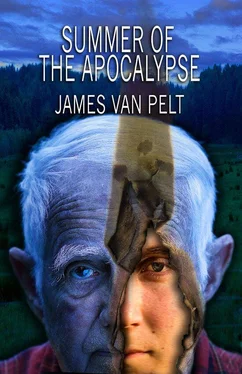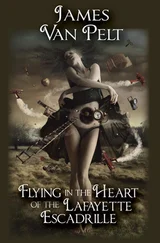Dodge pressed close behind Eric and whispered, “They’re Bugbears, Grandpa. I was just thirsty. He’s mean.” Dodge sounded more angry than frightened. Eric reached back and patted him on the arm. They rounded another corner. Here the old road builders had calved away a portion of a landscape to make way for the road. The bed cut deep through a hill, leaving almost vertical walls on either side. The clean cut revealed layers of different colored rocks. A million years an inch, thought Eric, and when mankind is done, we’ll be no thicker than a coat of paint on top of all of it. He walked close to one wall and saw that the road builders had cut into a seep. A line of dampness oozed at about head height and stretched the length of the cut. He reached to touch it, then drew his hand back. The seep looked unhealthy. Instead of clear water, it was red, and it thickly stained the rocks below. He stopped walking. For fifty feet in front of him, the red moisture coated the rocks, and he smelled something from it, coppery and foul. Coal Creek, only a couple of feet wide here, and fast, rushed by the base of the cut. Red leeched into the stream. Tendrils of it eddied in little pools, then vanished in the water that snatched it downstream.
In the length of creek from the boulders to here, not a thread of algae waved in the current, and, he realized, he’d seen no minnows, water striders or tadpoles, and not a single bird near the stream. He thought of the poem he’d made up that morning, where he’d compared the sun to a red whale surfacing on the horizon, but now he thought of the Earth as the whale, and somehow it was cut, and here it was wounded. Layers of rock scraped away like skin.
As if reading his mind, Teach stepped beside Eric and gazed at the red slime that slid down the crusty rocks into the tiny stream. “The land bleeds,” said Teach.
Chapter Ten
MORE PRECIOUS THAN WATER, AND NOT SO THIN
After five miles of riding his bike down U.S. 6, throwing himself to the gravel shoulder once when a truck rocketed by on the other side of the median heading west, cringing at the sound of a distant shot, too drained and frightened to consider crying, Eric decided to jump the waist-high concrete divider and head south to Littleton on the smaller streets. He crossed the two-lane frontage road into Union Ridge Park, where the grass was uncut but well watered. Sprinklers at the far edge of the park popped up and sprayed long streams. Sun rainbowed in the mist, and the air smelled wet and green. He paused at the swing sets. Their metal seats hung motionless above well-worn grooves in the grass. I used to swing, he thought. Feet in the air, head down. Whoosh. He imagined sitting quietly, hands wrapped around the chains, his feet dragging in the dust, waiting for Dad to give him a push. When his hip began to go numb from the bike leaning against it, he realized he hadn’t moved for minutes. A sound behind him made him start to turn. Then it seemed his head swelled, the ground slipped away—he was falling—and as he fell, he twisted and saw the sky. Slowly, so slowly it seemed, it turned to black.
Waves marched out of the horizon, green and glassy, building as they got closer. A hundred feet from shore, Eric saw a dark form in the water. A seal? he thought. Dad said there might be seals, but it was a patch of seaweed riding up the solid-looking slope. A frond waved forlornly at the crest, then disappeared as the wave slid in. Seconds later the smooth, cascade leaned too far forward, toppled from the top into foam and noise to rush up the beach, spent at his toes. Sizzling like bacon, the water slid back into the ocean to be swallowed by the next wave.
He scooted a foot closer to the sea, playing a game with the waves.
Far away from the beach, in another world, Eric strained against consciousness. His head hurt, and something pulled against his chest, holding him under the arms.
I’m dreaming I’m three. It’s the San Francisco trip when I was three, and we spent an afternoon on the coast.
He didn’t want to wake up—the world was bad; awful things waited for him there—he forced himself back to the dream.
Wind pushed spray into his face. He wiped the salt from his eyes. The next wave spilled itself on the sand, but stopped a yard short. He scrunched closer, and the next wash of water sent him scurrying backwards like a crab. He giggled. We’re playing tag, he thought. The film of water, no thicker than his hand, rushed away from him. Eric jumped up. Sand fell off his calves, and he brushed the back of his overalls. He loved the brass buttons that snapped the shoulder straps on because he could do them himself. Not like his shoelaces; they still gave him trouble. He rushed down the firm sand after the retreating wave. Water wants to play, he thought. I’ll chase it. But the wave retreated too quickly. I’ll catch you. He ran, hands outstretched, reaching, laughing, toward the ocean. Then, the next wave towered above him, and he stopped, his feet rooted to the sand. The dreamer Eric whimpered—he heard himself make the noise out of his dream—it was one he had often. The wave, that huge, unstoppable wave looming up, and panic, like frozen oil filling his head. Oh, Dad, he thought, and in the dream he looked back up the beach and saw his dad, a tiny figure, miles away it seemed.
“Daddy,” he yelled, and the ocean roared above him. “Daddy!” Nothing could save him; time stopped. He squirmed, and whatever pinched him under the arms squeezed even tighter, and then, in the dream, his dad was there, swooping Eric up and out of harm’s way, the water reaching no higher than Dad’s waist.
Dad held him high, hands locked under Eric’s armpits, and he laughed with Eric as the wave bubbled and foamed on the sand. Eric reached down and hugged his dad’s head.
The dreamer Eric thought, I’m alive. I’m alive and safe with my dad.
I can wake now. The dream is over. Everything is okay.
He awoke.
Nothing was okay.
Eyes closed, he struggled to breathe, but a tight band of pressure constricted his chest. Also, in dull, thudding rhythms, the back of his head throbbed. He tried to touch it, sure he’d find a baseball-sized lump, but his hands were trapped behind his back, and, oddly, he still felt his dad’s strong grip supporting his armpits. He was swaying, as if Dad were carrying him, but he knew he was awake. Finally, Eric forced his eyes open.
Slowly, the room rotated to his left. Eric felt nauseated, and clamped his eyes shut again. I’m in a basement, he thought. He’d seen a small window high on the wall. No other lights. Open rafters. Cement floor. A dusty water heater and furnace in a corner next to a beat up, wooden door; the edge of a toilet beyond in a darkened room. His inner ear told him he was still moving, so he sneaked another peek. I’m hanging! Below his feet, a tall, backless bar stool lay on its side. He kicked once and started swinging side to side. The rope creaked above him.
“Stay still,” said a voice behind him. Eric kicked himself around. As he rotated, he saw two other people on stools next to the wall. The closest one, a woman in her mid-twenties, dark hair, said, “I told you to not move. You’ll just get sick.”
The man sitting beside her did look sick. Eyes shut, face drawn, he sagged against his rope. On the next circuit, Eric saw that their ropes were tied to their necks, not their chests, and their hands were tied behind their backs too. He wondered if the sick man were dead, but the man shifted in his stool without opening his eyes. Two empty nooses hung from the rafters beyond them. An unlit stairwell led upstairs. Beside it, on the wall, hung a Budweiser mirror, and on the other side, a dart board, one of the fancy kinds with levered doors. Light blue or gray paint covered the walls except in the large patches where it had peeled away to the cement. He spun slowly, and when he stopped he faced the wall behind his stool. Duct tape held a Grateful Dead poster to the wall, the poster of a violin-playing skeleton with a long stemmed rose in his teeth.
Читать дальше












